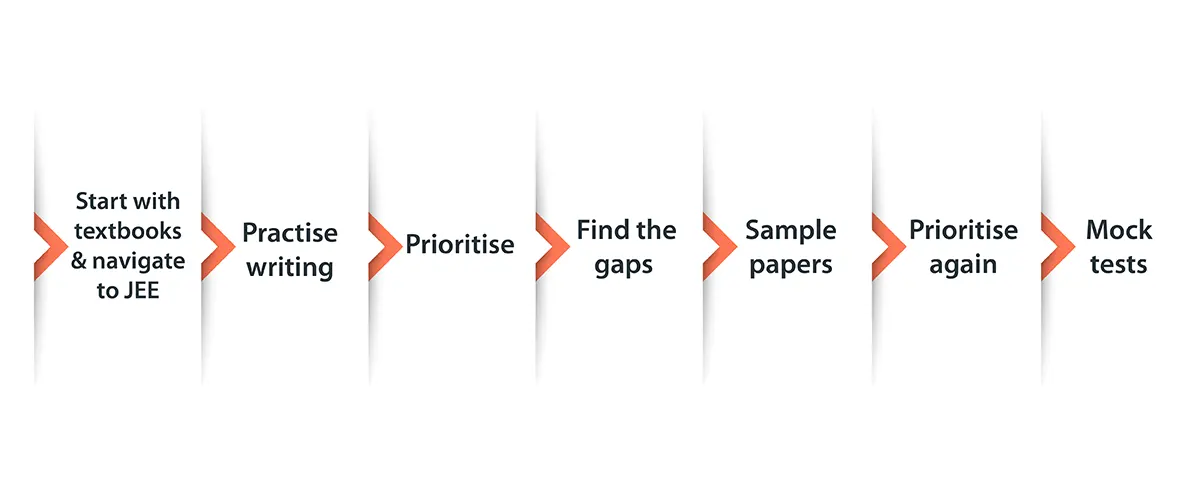JEE 2022 Mains dates are announced. CBSE also announced Term 2 starts on April 26. It’s the first time CBSE is conducting board exams in two parts. ISC board exams will also start at April end tentatively. So much is going on. Are you struggling to manage boards and JEE preparation together? We have a solution for you.
Use the below simple 7 step strategy to balance boards and JEE preparation.

1. Start with textbooks and navigate to JEE
You have 3 subjects overlapping between board exams and JEE exams- Physics, Chemistry and Maths. So, you can study each topic from the textbook first. It will set your base for the board exams. Further, you can study the same topic with JEE preparation material and solve the questions. This strategy will help to prepare for both exams together. You can set aside 20% time for the textbook and 80 % time for solving questions for every topic.
2. Practise writing
With JEE preparation, students tend to lose focus on writing subjective answers. Subjective exams come with extra requirements like writing detailed answers, solving derivations, presentation skills and drawing diagrams. So, practicing subjective questions is essential. Oswal Gurukul Objective and Subjective book gives you more than enough subjective questions on every chapter for practice. It comes with detailed solutions, mind maps and expert advice.
3. Prioritise
This time, the gap between JEE mains and boards is less based on tentative dates. Nevertheless, it’s important to prefer the exam, which is closer to the date. So, don’t stress to balance but prioritise instead.
4. Find the gaps
When the board exams approach, start studying like English and Physical education, which are not in JEE exams. These subjects are easy and have the potential to score high. Also, it’s essential to clear the cutoff(75 %-General, 65%-SC/ST/OBC) in the boards to get admission to the IIT or NIT. Studying these subjects will help you to clear the cutoff. You can also read our elaborate guides on CBSE and ICSE board exams.
5. Sample papers
Sample papers are a boon for board exams. They replicate the entire exam environment, give you potential questions, and help you find where you stand. Solving sample papers can give you the much-needed final touch to your board exam preparation. Oswal Gurukul sample papers strictly follow the reduced syllabus and give you 5-8 sample papers for each subject. You get detailed explanations for better understanding.
6. Prioritise again
After board exams, it will be time for JEE main’s second attempt. Don’t get lenient after the exam but quickly start the JEE preparation. Find any topics not covered in the textbook but can come in JEE exams. Study the pending topics, and revise what you already studied. Also, revise the class 11th syllabus.
7. Mock tests
After revision, start giving mock tests and find the topics you are getting stuck on. Revise and reiterate.
Mock test helps you get familiar with the exam pattern. Also, it teaches how to manage time and the pressure of the exam.
Also Read: 9 Effective Homework Strategies To Make Your Life Simple
Conclusion
The schedule looks hectic, but you can crack this one with the right strategy and calm mind. These seven steps will help you to balance boards and JEE preparation. Lastly, don’t forget to sleep enough, eat healthily and exercise.
All the best.

